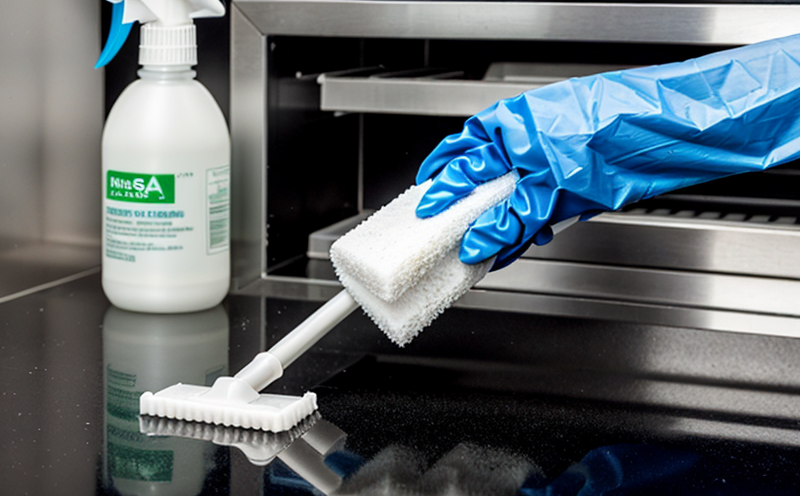BS EN 1040 Basic Bactericidal Testing of Plastic Hygiene Surfaces
The BS EN 1040 standard is a critical benchmark in the field of polymer and plastics testing, particularly for products intended to come into contact with human skin or bodily fluids. This standard sets out detailed procedures for assessing the bactericidal efficacy of plastic materials used in hygiene-related applications such as medical devices, personal care items, and food contact surfaces.
The primary aim of BS EN 1040 is to ensure that plastics do not only meet structural integrity requirements but also perform effectively in inhibiting bacterial growth. This standard applies specifically to plastics that are intended for use in hygiene-related products where the reduction or elimination of bacteria is a key requirement. The test method involves exposing the plastic specimen to a standardized inoculum of bacteria, followed by incubation under controlled conditions.
The testing process begins with selecting an appropriate bacterial strain, such as Escherichia coli (E. coli) or Saccharomyces cerevisiae, which are commonly used due to their ease of cultivation and relevance in hygiene applications. The specimen is then inoculated with the bacteria, and after a specified incubation period, the reduction in bacterial count is measured.
The BS EN 1040 procedure also includes specific requirements for sample preparation. This involves ensuring that the plastic surface is free from contaminants before testing. Specimens are typically prepared by cutting or grinding to standard dimensions, followed by thorough cleaning and sterilization. The use of appropriate media and reagents ensures accurate results.
The test setup requires a controlled environment where temperature, humidity, and other parameters can be closely monitored. This allows for consistent and reproducible testing conditions, which are essential for reliable data interpretation. Instruments such as incubators, spectrophotometers, and colony counters play crucial roles in the testing process. The results of these tests provide critical insights into the bactericidal performance of plastic materials.
The BS EN 1040 standard is widely recognized across Europe and beyond, making it a vital tool for manufacturers aiming to meet regulatory requirements and ensure product efficacy. Compliance with this standard not only enhances consumer trust but also supports quality assurance programs within organizations.
- International Acceptance: BS EN 1040 has been adopted in many countries, including the UK, Germany, France, Italy, and Spain, reflecting its broad applicability across different regions.
- Relevant Applications: This standard is particularly relevant for industries such as healthcare, food safety, and consumer goods where hygiene and sanitation are paramount.
The testing procedure outlined in BS EN 1040 ensures that plastic materials used in hygiene products effectively reduce bacterial populations. By adhering to this standard, manufacturers can guarantee the quality and safety of their products, thereby meeting both regulatory requirements and market expectations.
Eurolab Advantages
At Eurolab, we pride ourselves on providing comprehensive testing services that meet international standards like BS EN 1040. Our expertise in polymer and plastics testing is unmatched, thanks to our state-of-the-art facilities equipped with the latest technology and experienced professionals who understand the nuances of this field.
- Accurate Results: Our laboratory adheres strictly to the protocols defined by BS EN 1040, ensuring accurate and reliable bactericidal testing results.
- Comprehensive Testing Services: In addition to basic bactericidal testing, Eurolab offers a wide range of other polymer and plastics tests, including mechanical properties, chemical resistance, and flammability assessments.
- Certified Personnel: Our team comprises highly qualified professionals with extensive experience in polymer science and materials engineering.
- Regulatory Compliance: We help our clients comply with local and international regulations, ensuring that their products meet all necessary standards.
Choosing Eurolab for your BS EN 1040 testing needs means accessing unparalleled expertise and resources. Our commitment to quality and precision ensures that you receive the most accurate results possible, supporting your product development and compliance efforts effectively.
International Acceptance and Recognition
- Broad Adoption: BS EN 1040 is widely recognized across Europe and beyond, with many countries adopting it as a standard for testing plastic hygiene surfaces. This includes major markets like the UK, Germany, France, Italy, and Spain.
- Global Consistency: The standard ensures consistent bactericidal performance evaluations, facilitating easier trade between nations that recognize this standard.
- Regulatory Compliance: Adherence to BS EN 1040 helps manufacturers comply with global regulatory requirements for hygiene products, enhancing market access and consumer trust.
The international acceptance of BS EN 1040 underscores its importance in the polymer and plastics testing industry. By ensuring that plastic materials used in hygiene products perform effectively against bacterial contamination, this standard plays a crucial role in maintaining public health standards worldwide.
Use Cases and Application Examples
- Medical Devices: BS EN 1040 is essential for testing materials used in medical devices that interact with human skin or bodily fluids. This ensures the safety and efficacy of these products.
- Personal Care Products: For hygiene-related personal care items, such as toothbrushes and razors, this standard guarantees that plastic components do not harbor bacteria.
- Food Contact Surfaces: In the food industry, plastic materials used in packaging or handling equipment must demonstrate effective bactericidal properties to prevent contamination.
The real-world application of BS EN 1040 is vast and varied. It supports industries ranging from healthcare to consumer goods, ensuring that products meet stringent hygiene standards. By adhering to this standard, manufacturers can enhance product quality and safety, thereby building trust with consumers.
Examples of successful applications include the development of antimicrobial medical devices, the design of hygienic packaging materials, and the production of personal care items that are free from harmful bacteria. These applications highlight the importance of bactericidal testing in ensuring public health and product efficacy.





